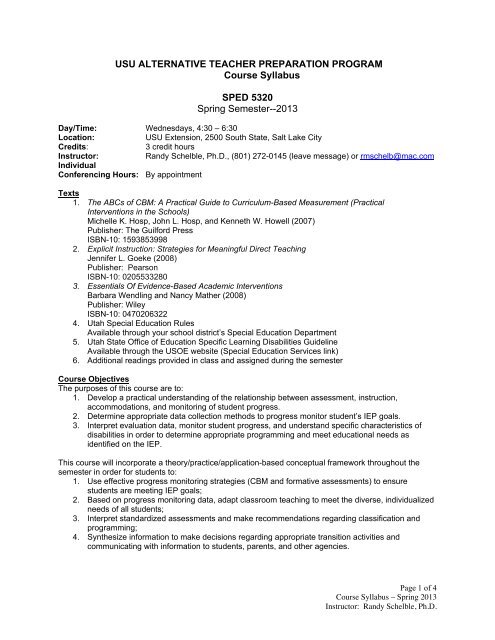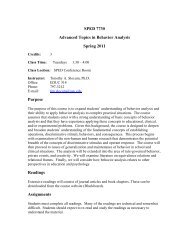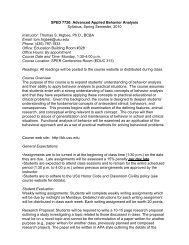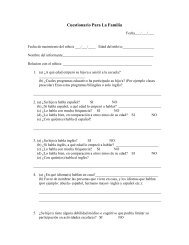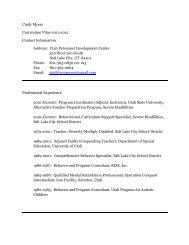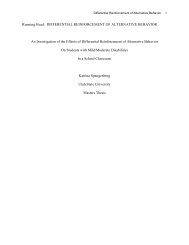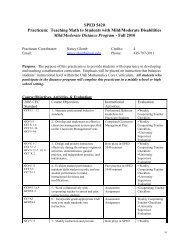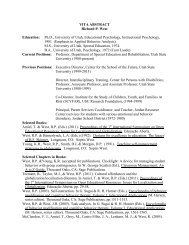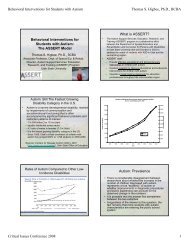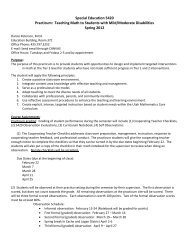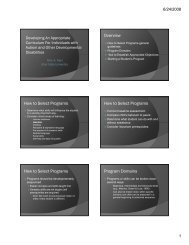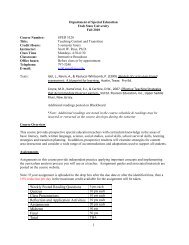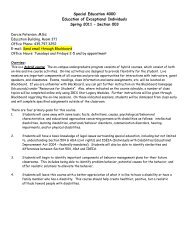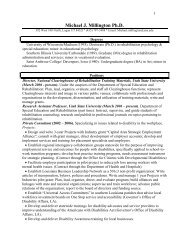Syllabus - Department of Special Education & Rehabilitation
Syllabus - Department of Special Education & Rehabilitation
Syllabus - Department of Special Education & Rehabilitation
Create successful ePaper yourself
Turn your PDF publications into a flip-book with our unique Google optimized e-Paper software.
USU ALTERNATIVE TEACHER PREPARATION PROGRAM<br />
Course <strong>Syllabus</strong><br />
SPED 5320<br />
Spring Semester--2013<br />
Day/Time: Wednesdays, 4:30 – 6:30<br />
Location:<br />
USU Extension, 2500 South State, Salt Lake City<br />
Credits:<br />
3 credit hours<br />
Instructor:<br />
Randy Schelble, Ph.D., (801) 272-0145 (leave message) or rmschelb@mac.com<br />
Individual<br />
Conferencing Hours: By appointment<br />
Texts<br />
1. The ABCs <strong>of</strong> CBM: A Practical Guide to Curriculum-Based Measurement (Practical<br />
Interventions in the Schools)<br />
Michelle K. Hosp, John L. Hosp, and Kenneth W. Howell (2007)<br />
Publisher: The Guilford Press<br />
ISBN-10: 1593853998<br />
2. Explicit Instruction: Strategies for Meaningful Direct Teaching<br />
Jennifer L. Goeke (2008)<br />
Publisher: Pearson<br />
ISBN-10: 0205533280<br />
3. Essentials Of Evidence-Based Academic Interventions<br />
Barbara Wendling and Nancy Mather (2008)<br />
Publisher: Wiley<br />
ISBN-10: 0470206322<br />
4. Utah <strong>Special</strong> <strong>Education</strong> Rules<br />
Available through your school district’s <strong>Special</strong> <strong>Education</strong> <strong>Department</strong><br />
5. Utah State Office <strong>of</strong> <strong>Education</strong> Specific Learning Disabilities Guideline<br />
Available through the USOE website (<strong>Special</strong> <strong>Education</strong> Services link)<br />
6. Additional readings provided in class and assigned during the semester<br />
Course Objectives<br />
The purposes <strong>of</strong> this course are to:<br />
1. Develop a practical understanding <strong>of</strong> the relationship between assessment, instruction,<br />
accommodations, and monitoring <strong>of</strong> student progress.<br />
2. Determine appropriate data collection methods to progress monitor student’s IEP goals.<br />
3. Interpret evaluation data, monitor student progress, and understand specific characteristics <strong>of</strong><br />
disabilities in order to determine appropriate programming and meet educational needs as<br />
identified on the IEP.<br />
This course will incorporate a theory/practice/application-based conceptual framework throughout the<br />
semester in order for students to:<br />
1. Use effective progress monitoring strategies (CBM and formative assessments) to ensure<br />
students are meeting IEP goals;<br />
2. Based on progress monitoring data, adapt classroom teaching to meet the diverse, individualized<br />
needs <strong>of</strong> all students;<br />
3. Interpret standardized assessments and make recommendations regarding classification and<br />
programming;<br />
4. Synthesize information to make decisions regarding appropriate transition activities and<br />
communicating with information to students, parents, and other agencies.<br />
Page 1 <strong>of</strong> 4<br />
Course <strong>Syllabus</strong> – Spring 2013<br />
Instructor: Randy Schelble, Ph.D.
CEC Individualized Independence Curricula (IIC) and Individualized General <strong>Education</strong> Curricula (IGC)<br />
Standards, Course Objectives, and Student Evaluation<br />
Course Objectives<br />
1. Conduct a variety <strong>of</strong> CBAs (survey,<br />
focus, monitoring), record student<br />
performance, evaluate results, and<br />
target appropriate instructional<br />
targets.<br />
2. Understand the characteristics <strong>of</strong><br />
high incidence disabilities<br />
Common Core (CC) and<br />
Individualized General<br />
Curriculum (GC)<br />
Standards<br />
CC2K2, CC2K5, CC4K1,<br />
CC4S4, GC4S1, GC4S13,<br />
GC6S3, GC7K5 CC8K1,<br />
CC8S4, CC8S8, CC8S9,<br />
CC8S10<br />
GC1K1, CC3K1, CC3K2,<br />
CC3K4, CC3K5, GC3K1,<br />
GC3S1<br />
3. Use case study material to<br />
exemplify the evaluation process<br />
that includes pre-referral<br />
CC1K5, CC1K6, CC1K7,<br />
CC8K2, CC8K3, GC8K2,<br />
GC8K3, CC8S1, CC8S5,<br />
interventions, evaluation <strong>of</strong> student, CC8S6, CC8S7<br />
determination <strong>of</strong> eligibility,<br />
and development <strong>of</strong> an IEP<br />
4. Describe the essential components <strong>of</strong> CC8S2, GC8S1, GC8S2,<br />
evaluation for learning disabilities, GC8S3, GC2K4, GC1K1<br />
emotional/behavioral disorders,<br />
and intellectual disabilities<br />
5. Develop an IEP that includes<br />
measurable goals and objectives<br />
based on evaluation<br />
data<br />
6. Plan math lessons and adapt<br />
instruction to address the math<br />
common core<br />
CC1K1, CC1K4, GC1K5,<br />
GC5K3, CC5S3, CC7S6<br />
IGC4K6, IGC4S4, IGC4S5,<br />
IGC4S13, IGC5S3, IGCS1,<br />
IGC7S3, ICC7S12<br />
Instructional Activities and<br />
Student Evaluation<br />
• Lecture/Small<br />
group discussion<br />
• In-class assignments<br />
• Fluency timings<br />
• CBA Case Study<br />
assignment<br />
• Final test<br />
• Lecture/Small group<br />
discussion<br />
• Class examples<br />
• Written and Oral Reports<br />
• Lecture/Small group<br />
discussion<br />
• Case Study: Evaluation<br />
and Assessment<br />
Assignment<br />
• Final exam<br />
<br />
Lecture/Small group<br />
discussion<br />
• Case Study: Evaluation<br />
and Assessment<br />
Assignment<br />
• Lecture/Small group<br />
discussion<br />
• Case Study: Evaluation<br />
and Assessment<br />
Assignment<br />
• Lecture/Small group<br />
discussion<br />
• Math Lesson Plan<br />
assignment<br />
Page 2 <strong>of</strong> 4<br />
Course <strong>Syllabus</strong> – Spring 2013<br />
Instructor: Randy Schelble, Ph.D.
Course Requirements<br />
1. Attendance:<br />
Because <strong>of</strong> the nature <strong>of</strong> the ATP program, attendance for the full class time is expected <strong>of</strong> all<br />
students. Given the expectation <strong>of</strong> the school district and Utah State Office <strong>of</strong> <strong>Education</strong> that you<br />
complete your special education licensure during your enrollment in this program, attendance at class<br />
must have a priority over other responsibilities (i.e., coaching, part-time jobs, etc). Attendance<br />
requirements are:<br />
• Attend each class having read the week’s assigned readings and having completed any<br />
classroom-based activities. You should be prepared with class homework assignments and<br />
ready to participate and share during class time.<br />
• Students are responsible for getting to class on time and will be expected to remain in class<br />
unless previously arranged with the instructor. If tardiness becomes a problem, pr<strong>of</strong>essional<br />
points will be deducted.<br />
• If students are late or absent, they are responsible for getting class information from their<br />
colleagues.<br />
• To receive a passing grade, 2 absences are allowed. Weekly points (attendance, class<br />
participation points, pr<strong>of</strong>essional points) will not be awarded on nights that a student is absent<br />
(excused or unexcused).<br />
• A student who misses more than two classes during the semester (including Parent-<br />
Teacher Conferences, illness, emergencies) will be in jeopardy <strong>of</strong> not passing the class and<br />
will be expected to arrange a meeting with the Dr. Randy Schelble and Dr. Marilyn Likins to<br />
discuss your progress.<br />
2. Submit all assignments and take exams on the dates announced by the instructor or specified in the<br />
syllabus. A Product Guide and Grading Rubric specifying the expectations and requirements for<br />
assignments will be distributed by the instructor.<br />
3. Maintain confidentiality <strong>of</strong> students during class discussions and in written assignments.<br />
4. Behave in an ethical and pr<strong>of</strong>essional manner in class and in completing assignments at your school<br />
site. Behavioral expectations include:<br />
• Respecting the instructor’s and classmates’ time by not dominating class discussion with<br />
personal issues, examples, and concerns.<br />
• Restraining from side conversations with classmates during presentations by the instructor,<br />
guest presenters, and/or classmates.<br />
• Maintaining order and cleanliness in the classroom by leaving the room as it was when you<br />
arrived, not using supplies left in the room by the classroom teacher, and carrying out all<br />
garbage to receptacles in the hallways or outside.<br />
• Resolving issues and concerns about assignments or expectations privately with the<br />
instructor and/or cooperating teacher.<br />
Course Assignments<br />
Development <strong>of</strong> a comprehensive plan to incorporate curriculum-based measurement to monitor student<br />
progress. Students will develop a class-wide procedure and year-long plan that includes administering<br />
benchmarks and probes as well as interpreting CBM data for a reading or math.<br />
Case study involving interpretation <strong>of</strong> evaluation results and development <strong>of</strong> an IEP to address student’s<br />
educational needs. Students will review, analyze, and interpret evaluation data <strong>of</strong> an identified student<br />
and develop appropriate IEP goals and procedures for monitoring progress.<br />
100 Common Terms Used in <strong>Special</strong> <strong>Education</strong>: Students will learn 100 special education vocabulary<br />
terms and be able to identify word and definition with fluency.<br />
Philosophy <strong>of</strong> Teaching Project: Students will independently read and respond by email to e-journal<br />
prompts provided by the instructor throughout the semester. The final product will be a composite <strong>of</strong> the<br />
responses developed into a final, approved Philosophy <strong>of</strong> Teaching paper which must be submitted the<br />
Page 3 <strong>of</strong> 4<br />
Course <strong>Syllabus</strong> – Spring 2013<br />
Instructor: Randy Schelble, Ph.D.
last night <strong>of</strong> class. To receive credit, the ongoing revisions based on previous e-journal responses must<br />
be submitted for review. The final copy must be submitted on the last night <strong>of</strong> class to receive credit.<br />
Math Lesson Plans Assignment (50 points). Students will write math lessons plans that incorporate the<br />
common core math standards and use the explicit instruction lesson plan template provided in class. A<br />
Product Guide will be provided to students outlining in detail the expectations and criteria for meeting<br />
competency.<br />
Mini-Assignments and On-line quizzes: Students take on-line quizzes and independently complete miniassignments<br />
to reinforce key information from class and chapter readings.<br />
Class preparation, participation, and pr<strong>of</strong>essional behavior: Class preparation includes class/homework<br />
assignments that are typed and completed by the date specified. Class participation includes class<br />
attendance, being on time, participation in class discussions, participation in small group and cooperative<br />
activities, demonstrating pr<strong>of</strong>essional behavior.<br />
Grading<br />
Points assigned to each task are as follows:<br />
<strong>Special</strong> <strong>Education</strong> Terms Fluency Timings .............................................................................200<br />
Curriculum-Based Measurement Assignment .......................................................................100<br />
Case Study: Interpretation <strong>of</strong> Evaluation Results ....................................................................100<br />
Final: 100 <strong>Special</strong> <strong>Education</strong> Vocabulary Terms Three-Minute Timing..................................100<br />
Quizzes.................................................................................................................................... 80<br />
Math Lesson Plan Assignment ................................................................................................ 50<br />
Final Philosophy <strong>of</strong> Teaching Paper ........................................................................................ 50<br />
Weekly attendance, participation, pr<strong>of</strong>essional behavior......................................................... 60<br />
TOTAL POINTS POSSIBLE 740<br />
All quizzes and assignments submitted through Canvas must be submitted by the date indicated to<br />
receive credit. Late assignments will receive a 5 point reduction on the final grade <strong>of</strong> the assignment<br />
for EACH CALENDAR DAY LATE<br />
For the Curriculum-Based Measurement and Interpretation <strong>of</strong> Evaluation Results assignments handed in<br />
at the beginning <strong>of</strong> class: Assignments handed in late will receive a 5 point reduction on the final grade<br />
<strong>of</strong> the assignment for EACH CALENDAR DAY LATE. It is the responsibility to get the late assignment<br />
to the class instructor. It is the responsibility <strong>of</strong> the student to contact the instructor and make<br />
arrangements regarding when the late assignment will be delivered. Please review the feedback on your<br />
assignments and check for addition errors! If addition errors are incorrect or you do not understand why<br />
you lost points, please email the class instructor immediately.<br />
Grading Scale<br />
Semester letter grades for will be assigned based on percentage <strong>of</strong> the total points earned as follows:<br />
A = 100-95% A- = 94-90%<br />
B+ = 89-87% B = 86-83% B- = 82-80%<br />
C+ = 79-77% C =7 6-73% C- = 72-70%<br />
D+ = 69-65% D = 64-60%<br />
F = below 60%<br />
NOTE:<br />
1. An incomplete grade will only be given under circumstances specified in USU’s policy.<br />
Incomplete grades will not be given for poor performance. In addition, poor grades (or at least<br />
grades lower than you desire) stand. No opportunities for improving a grade will be provided.<br />
2. Only a semester grade <strong>of</strong> “C” <strong>of</strong> higher may be counted toward certification.<br />
ADA Accommodations<br />
Students needing accommodations must contact the instructor to review identified needs. Arrangements<br />
must be made within the first two weeks <strong>of</strong> class.<br />
Page 4 <strong>of</strong> 4<br />
Course <strong>Syllabus</strong> – Spring 2013<br />
Instructor: Randy Schelble, Ph.D.


